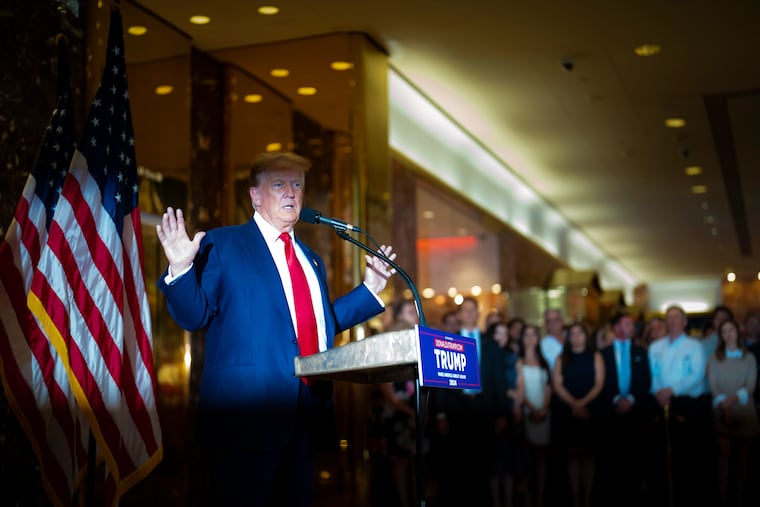Donald Trump isn’t alone when it comes to crying ‘rigged’ over an outcome he doesn’t like
There were tsks all around when the 45th president said, without evidence, that the verdict in his trial was fixed. In reality, many of us have engaged in the same kind of thinking.

“This is a scam. This is a rigged trial.”
That’s what Donald Trump said after he was convicted last week on 34 counts of falsifying business records.
And here’s what Joe Biden said, in response: “It’s reckless, it’s dangerous, it’s irresponsible for anyone to say this was rigged just because they don’t like the verdict.”
Biden was right. There is no evidence — none — that he somehow fixed the trial or its outcome, as Trump falsely claimed. And Trump’s lies have surely undermined faith in the rule of law. “Our justice system should be respected,” Biden added. “We should never allow anyone to tear it down.”
But it turns out many of us may be more like Trump than we want to think we are.
When an outcome — whether in a legal case or just about any other context — doesn’t conform with our personal beliefs, a lot of us will say the system is a fraud. And that reinforces the same disrespect Biden denounced.
Consider the case of Michael Brown, a Black teenager who was shot and killed by a white police officer in Ferguson, Mo., in 2014. It triggered several weeks of civil unrest, which flared again when a grand jury declined to indict Officer Darren Wilson for killing Brown.
My immediate response, at the time, echoed Trump’s after his criminal trial: the outcome must have been rigged. After all, there’s a huge and ugly history of racism against African Americans in criminal justice. And this seemed like more of the same.
A Black victim who allegedly raised his hands in surrender before he was gunned down. A white prosecutor who didn’t recommend a charge to the grand jury, but instead let it decide everything on its own. A white police officer who testified for four hours without cross-examination. And a city where there had been at least a dozen fatal police shootings in the previous 20 years, without a single indictment.
A month before the grand jury decision, Washington Post columnist Dana Milbank wrote that “the fix is in.” When the decision came down, I wasn’t in the least bit surprised. But I was appalled.
So were most of my fellow liberals. On MSNBC, legal analyst Lisa Bloom declared that the prosecutor had “rigged the system.” And it seemed obvious — to me — that she was right.
She wasn’t. Several months later, the U.S. Department of Justice released a detailed report rejecting the allegation that Brown had held up his hands before Wilson killed him. The claim was “inconsistent with the physical and forensic evidence,” the report said. And witnesses who had originally confirmed the allegation later recanted it, “admitting that they did not witness the shooting.”
By that time, “Hands up, don’t shoot” had already become an article of faith — and a catalyst of protest — in liberal precincts. But it was “built on a lie,” as the Washington Post’s Jonathan Capehart wrote. “Brown never surrendered with his hands up, and Wilson was justified in shooting Brown,” he concluded.
Capehart, who is Black, was one of the leading mainstream media voices who acknowledged the truth. But the myth that Brown held his hands up persists, facts notwithstanding.
Brown “would be alive today if the institutions of racism and white supremacy were eradicated,” Rep. Cori Bush (D., Mo.) tweeted last year, on the ninth anniversary of Brown’s death. “We will continue to fight for justice and accountability.”
Racial injustice is real, of course, and we should all continue to fight against it. The same DOJ report that debunked “Hands up” also described racist emails by Ferguson police officers, excessive use of Tasers and police dogs against Black suspects, and expensive fines levied for minor infractions.
Yet, the overall pattern of racist policing in our society doesn’t prove any particular allegation of it. If you continue to claim — against all evidence — that Brown was killed with his hands up, you’re undermining faith in the law. Just like Trump.
Of course, it’s a thousand times worse for the once — and possibly future — president of the United States to do that. Whenever anything goes against him (see the 2020 election), Trump says it was rigged.
But if you want to refute Trump, you also have to be better than him. Repeating falsehoods about the Brown case makes a mockery of actual racial injustices in America. And it feeds cynicism about our legal and political institutions, which is Trumpʼs ultimate goal.
The entire GOP establishment is now rallying behind Trump’s lies. The only way we can rebut him is by telling the truth, which also means admitting when we haven’t. The system isn’t perfect, that’s for sure. But it’s not rigged, either.